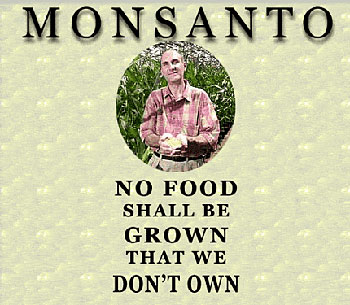After receiving the largest cash offer on record, Monsanto has agreed to be acquired by Bayer for an incredible $66 billion ($128 per share).
Thus forms the largest agrichemical and seed company in the world, controlling over 25% of the market. Bayer hopes to close the deal by the end of 2017.
While Monsanto is known for glyphosate, Bayer’s notoriety is around Imidacloprid, a neonic pesticide that’s decimating pollinators.
Glyphosate use is so widespread (#1 herbicide in the world) that it’s in the urine of 93% of Americans.
“Now the most evil company in Europe has absorbed the most evil company in America,” Dave Murphy, Executive Director of Food Democracy Now!, told Ecowatch. Their new corporate motto should be ‘Killing bees and butterflies for fun and profit.”
Read, How the National Academy of Sciences misled the public over GMO food safety.
On October 15-16, Monsanto faces a trial at The Hague for crimes against nature and humanity.
Farmers are rightly concerned that fewer and fewer seed varieties will be available and that prices will rise. But that’s what monopolies do … and supposedly why we have anti-trust laws in the US and EU.
Will regulators allow this to go through? Sign the petition against the merger.
Other major GMO producers would also like to merge – DuPont and Dow Chemical – and Syngenta and China National Chemical Corp. (ChemChina) have received approval.
Allowing monopolistic power among fewer and fewer multinationals is behind increasing income inequality and the decline of influence of everyone else. Multitudes of lobbyists and campaign contributions result in government policies and legislation that truly rigs the economy and threatens democracy.
In Africa, Monsanto and Dupont have been pushing hard to introduce GMO crops, and the Bill & Melinda Gates Foundation and USAID has bought their propaganda. The African Centre for Biodiversity accuses them using “the guise of philanthropy” to infiltrate the continent. Companies donate GMO technology royalty-free to get the process rolling.
Take The Urgent Need to Protect Pollinators, For Example
Monsanto, Bayer and Syngenta have successfully lobbied to prevent strong regulations that would protect bees, butterflies and other pollinators, according to Buzz Kill, a report by Friends of the Earth (FOE).
“The pesticide industry has weakened and delayed pesticide reforms and is shaping new pollinator ‘protection’ plans nationwide that do little to protect bees, but a lot to protect industry profits,” they say.
44% of US bee colonies died this past year, up 3.5% from 2015.
Lobbying on the state and federal levels has resulted in “pollinator protection plans” that “lack metrics to measure effectiveness, improvement, or failure” and often “provide more protections for pesticides and pesticide users than for bee keepers and bee colonies.”
Also, there’s the “revolving door,” where public officials leave to work at the corporations they regulated or where private sector representatives “infiltrate” regulatory agencies. Private corps fund research and education initiatives in “public/private partnerships”.
Another report by FOE shows that corporations can also have a beneficial impact. Since Home Depot and other big box stores were taken to task for selling “bee-friendly” garden plants pre-treated with neonics, the percentage of those plant sales has dropped dramatically. In 2014, more than half of plants were pre-treated, dropping to 23% this year.
Zika Virus
Even though state and local officials are allowed to use chemicals “as needed” to spray mosquitoes as a response to Zika, Republicans in the House used it as an opportunity to loosen pesticide regulations.
Democrats almost unanimously opposed the bill, which loosens environmental protections on pesticides and other chemicals under the Clean Water Act.
Corporate Power Exceeds Many Countries
The world’s 10 largest corporations have more wealth than most countries combined!, concludes a study by UK-based Global Justice Now. Their combined value is $2.9 trillion -larger than China’s economy.
Out of the 100 wealthiest economic entities in the world, 69 are corporations and 31 are countries, they say, warning that “within a generation we will be living in a world entirely dominated by giant corporations.”
Largest Entities and their Value
US: $3.3 trillion
China: 2.4 trillion
Germany: 1.5 trillion
Japan: 1.4 trillion
France: 1.3 trillion
UK: 1.1 trillion
Italy: 876 billion
Brazil: 631 billion
Canada: 585 billion
Walmart: $482 billion
Spain: 473.6 billion
Australia: 425.7 billion
Netherlands: 336.5 billion
State Grid Corp of China: 329.6 billion
China National Petroleum: 299.3 billion
Sinopec Group: 294 billion
South Korea: 291 billion
Royal Dutch Shell: 272.2 billion
Mexico: 259.6 billion
Sweden: 250.8 billion
Exxon Mobil: 246.2 billion
Volkswagen: 236.6 billion
Toyota: 236.5 billion
India: 236 billion
Apple: 233.7 billion
Belgium: 226.8 billion
BP: 225.9 billion
Other corporations in the top 50 entities are: Berkshire Hathaway (#32); McKesson (#35); Samsung Electronics (#37); Glencore (#39); Industrial & Commercial Bank of China (#40); Daimler (#41); UnitedHealth Group (#43); CVS Health (#44); EXOR Group (#45); General Motors (#46); Ford (#47); China Construction Bank (#48), AT&T (#49) and Total (#50).
Monopolies deprive governments of revenue by stashing profits in offshore accounts and push for trade deals where private tribunals nullify judicial systems. They are behind the drive to privatize everything so they can make endless, short-term profits – literally tearing the world apart through environmental destruction and climate change.
Read, The Complete History of Monsanto, The World’s Most Evil Corporation: http://www.globalresearch.ca/the-complete-history-of-monsanto-the-worlds-most-evil-corporation/5387964

